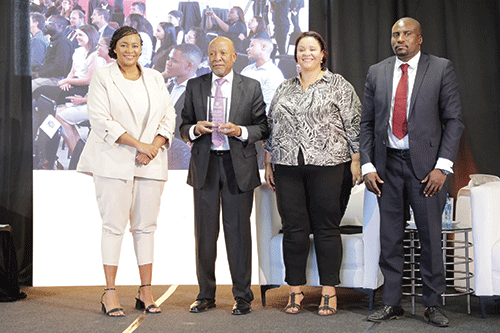Education will always remain the government’s top priority to reduce poverty in the country. President Nangolo Mbumba said this yesterday while officiating at the University of Namibia Foundation brand and fundraising projects’ launch.
He expressed gratitude for the allocation of N$18.3 billion to the education sector, highlighting the government’s dedication to investing in the future of Namibia’s youth.
“I hope this will translate into a higher ceiling of allocation for institutions of higher learning such as Unam, Nust and others. In this way, many Namibians can obtain quality education and actively become emancipators in the fight against structural and historical poverty,” he said. He added that late president Hage Geingob’s administration in 2015 declared poverty as a key focus area to be addressed, and for that reason, the Harambee Prosperity Plan I and II were developed to eradicate structural and historical poverty caused by the discriminatory policies of the past apartheid administrations in Namibia.
Mbumba said in recognition of the important role of education to bring about shared prosperity in communities, government has invested heavily in the education sector since independence.
“Funding education and seeing to it that the allocations are well-spent to deliver the expected results becomes our obligation. Much will need to be done to ensure a healthy balance between operational expenditure and funds spent on the welfare of both school-going and university students,” he continued.
The President noted that the issues of textbook shortages, infrastructure deficiencies, and quality of lecturing, curriculums and education aids must be attended to in an efficient and effective manner. In the long run, the country
must thus derive maximum value from allocations to the education sector.
“I am happy to take note that Unam, under the auspices of the Unam Council and the Office of the Vice Chancellor, established the Unam Foundation to augment government efforts by enlisting stakeholders to secure additional resources to provide excellent educational infrastructure, quality teaching, learning, innovation and research.”
The main purpose was to provide a well-resourced conducive environment to help equip students to become well-grounded graduates.
He noted that it is not about the brick and mortar, but rather about the outcomes facilitated by the education infrastructure and equipment which facilitates better instruction, improves student outcomes, and reduces dropout rates.
“It is also heartening that the foundation has initiated a bursary programme with the objective to assist needy students in order to reduce barriers to access to quality higher education,” he observed.
One of the Unam Foundation beneficiaries is second-year student Tangi Amushelelo, who applauded the foundation by saying “when I was called and told I was awarded a bursary, I was very happy.
The Unam Foundation has lifted the financial burden that was weighing on my parents”.
He added that the bursary provides him with the essential resources needed to excel, and ensures that he has textbooks and stationery. It also ensures that he has everything he needs to strive for in his academic journey.
“My parents, who are tirelessly supporting a family of four children, face difficulties in funding two of us who are in university. With this bursary, it made it easier for my parents to fund my other sibling.
They are no longer worried about how to put together tuition fees for both my sister and I. This is a relief, and I am very grateful,” he beamed.
On his part, Unam vice chancellor Kenneth Matengu said: “Foundations are mandated to raise funds and other resources, and they are expected to manage private support to a university while honouring donor intent. By law, they separate legal entities with their own governance structures and boards”.
The Unam Foundation is, therefore, no different. It is a registered legal entity with a board reporting to the council.


